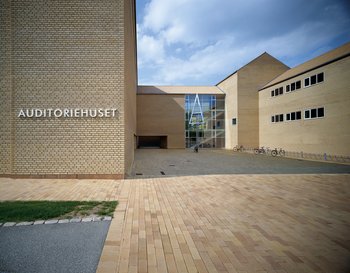
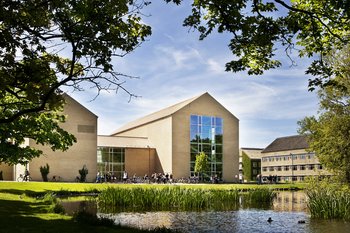
The conference venue is located at Aarhus University Campus in the city of Aarhus, Denmark. Aarhus is the second-largest Danish city, and is located in the western part of Denmark on the Jutland peninsula.
Five auditoriums, accommodating from 60 to 450 persons, are available for the plenary and parallel sessions. The coffee breaks, lunches and poster session will take place in the main hall at the Lakeside Lecture Theatres complex.
The address of the conference venue is:
Lakeside Lecture Theatres
Building 1250-1253
Bartholins Allé 3
8000 Aarhus C
The venue is within walking distance (app. 1,5 km) from hotels, train station and airport shuttle busses. A number of bus lines run frequently between the central bus station and the University Campus (e.g. busses 1A, 12, 13, 17, 18, 200, use the stop 'Aarhus Sygehus, Nørrebrogade'). You can find a journey planner at http://www.rejseplanen.dk/.
Go to an interactive map of the Aarhus University Campus
Download a map of central Aarhus (with the conference venue, hotels and conference dinner venue indicated)
Please see the 'Scientific content' and 'Programme' sections for more information on the scientific content.
If you are presenting an oral presentation or a poster, you can find the practical details in our Guide for presenting authors You are welcome to use the conference power point template.
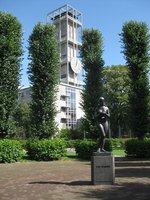
The conference will begin with a reception and early registration at Aarhus Town Hall from 17:00-18:30 Wednesday, October 2nd. The address is Rådhuspladsen 2. 8000 Aarhus
C
The poster session including refreshments will be held at the Lakeside Lecture Theatre complex on Thursday October 3rd from 17:00 to 18:15 h
The conference dinner will be held on Thursday October 3rd at 19:30 h. at 'Turbinehallen' (Note: Updated!) (go to website in Danish), Kalkværksvej 12, Aarhus C. Doors will open at 18.30 h.
The deadline for submission of abstracts and session topics was May 15th. Deadline for early registration at a reduced fee was July 1st. Registration closes October 1st.
The conference is for scientists, Ph.D. students, administrators, managers, representatives of industry and non-governmental organisations as well as decision-makers working on the topics encompassed by the Climate Action and Resource Efficiency challenge. The conference language is English.
The registration fee covers the programme, lunches, coffee breaks etc, as well as conference dinner and the book of abstracts. It does not include accommodation.
You can register and pay online here.
| Paid before July 1st | Paid after July 1st |
Participant fee | DKK 2.625 (EUR 350) | DKK 3.150 (EUR 420) |
Student fee* | DKK 1.500 (EUR 200) | DKK 1.500 (EUR 200) |
* Please send a copy of your student identification card and a statement from your institution documenting your current involvement in a Masters or PhD programme together with a copy of your registration confirmation to environment2013@kongreskompagniet.dk
You can book accomodation when registrering for the conference at special conference rates (first come, first serve). The hotels included are:

During the conference planning process, the organising committee has thought sustainability into every decision.
The food served throughout the conference will favour climate-friendly, locally produced food, thus avoiding e.g. red meat. Only fish from populations that are not over-exploited are served.
The tea served is organic; the coffee served is Rainforest Alliance certified, which means that biodiversity and tropical forest conservation as well as social equity has been taken into consideration throughout the production of the coffee.
Coffee, tea and other drinks will be served in 100% compostable, biodegradable corn starch cups. Water will be clean Danish tap water served in reusable pitchers, to reduce on the use of resources and transport of plastic bottles.
The conference bag is an organic fair-trade cotton tote bag in natural white. The print on the bag is non-toxic. The conference bag contains a long-lasting, 80% biodegradable pen, made from wood powder and a vegetable based plastic. The folder is made of 100% recycled craft paperboard, completely chlorine-free (TCF). The stickers produced for the folders are made in a Nordic Eco-labeled printing house and stickers are CO2-neutral. The abstract book is printed on FSC-certified paper with non-toxic print.
The city of Aarhus is located in the western part of Denmark on the Jutland peninsula. You can find more information about the city and how to get there at the Aarhus tourist information pages Visit Aarhus.
Aarhus Airport (AAR) is the nearest airport, about 45 minutes from the city. Limited number of direct international flights, but direct flights to Copenhagen, Oslo, Stockholm and London (Stansted)
The departure times of the airport shuttle are not planned until flight departures/arrivals to and from Aarhus Airport have been determined. Therefore, you may experience that the departure times of the airport shuttle are only known 2 or 3 weeks ahead in time. Therefore it is not possible to search for an airport shuttle departure months ahead.
If you have questions about the airport shuttle or departure times, please contact Midttrafik Kundecenter (customer service) on tel. +45 70 210 230, which is open for information every day from 7.00 AM to 11.00 PM.
Billund Airport (BLL) is located 100 km south of Aarhus.
The airport has a larger number of non-stop services from major European destinations.
There is an airport shuttle bus to Aarhus from Billund Airport, called RUTE 912X. Tickets are sold on the bus. Most foreign currencies and credit cards are accepted. The travel time from Billund to Aarhus is approx. 1 hour. One-way fare is DKK 154 (per April 2013). The bus stops at the railway station in the city centre of Aarhus (Hovedbanegården), final stop is at the bus station in Aarhus (Rutebilstationen). Shuttle buses are equipped with toilets as well as free Wi-Fi.
Copenhagen Airport (CPH) is about 3 hours ride by train from Aarhus. Denmark's largest international airport with direct flights to most destinations.
You can use the journey planner at www.rejseplanen.dk to find a convenient train for your travel. Please note, even though you type the English names of the stations, the jouney planner will show the Danish names:
Copenhagen Airport | = Københavns Lufthavn, Kastrup |
Aarhus Central Station | = Aarhus St |
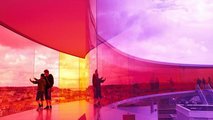
Aarhus is the second largest city in Denmark with a population of approximately 315,000. The culture is lively and young, mainly due to the city’s large student population (approx. 40,000).
Aarhus is an old city, founded by the Vikings as an open trading post at the mouth of the river. Aarhus is an educational and cultural centre, and its true soul is a charming blend combining the atmospheres of a beautiful town and an active city. Scattered around the city you will find many restaurants, bars and cafes, many of which are located at the river and suited to all budgets.
Aarhus offers many attractions – such as the open-air museum “The Old Town”, AROS Museum of modern art (with the Rainbow Panorama), Marselisborg Castle, Queen Margrethe II’s summer residence and many more. Discover its delights yourself. Most attractions are within walking distance.
For further information about Aarhus please see VisitAarhus’ web site www.visitaarhus.dk.
You can choose from a number of mobile options as well:
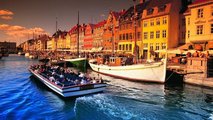
Banks
Banks are open from 09:30 to 16:00 on weekdays with late hours until 18:00 on Thursdays (closed Saturdays and Sundays). There are numerous cash machines throughout the city and the money transfer offices are open on Saturday from 10:00 to 15:00, for example Forex Bank at Banegårdspladsen 20.
Currency
The currency in Denmark is Danish Kroner (DKK). One krone is divided into 100 Øre. The exchange rate to Euro is app. 7,45 krone per Euro.
Electricity
Danes use 220 volt for electric appliances. Denmark, like most other European countries, has 220-volt AC, 50Hz current and uses two-pin continental plugs. If you visit from the UK and Ireland, you will need an adaptor for electric appliances, whereas North Americans need a transformer in order to use their 110/125V appliances.
Language
The mother tongue in Denmark is Danish, which is closely related to both Swedish and Norwegian. In General Danes speak English very well, and some even German and French.
Time zone
Denmark follows Central European Time (CET) which is one hour ahead of Greenwich Mean Time (GMT) and six hours ahead of Eastern Standard Time (EST).
Weather
The weather in Denmark is heavily influenced by the country’s proximity to both sea and to the continent. This means that the weather varies depending on the dominant wind direction and the season.
You can check the weather forecast here: http://www.dmi.dk/eng/index/forecasts.htm
Tipping
Tipping is greatly appreciated, but not expected, and you should only do so if you feel you are getting exceptionally good service. If you do so 10 percent of the bill is sufficient.
Local transportation
It is very easy and safe to travel around the city by bus, train or taxi. You can buy tickets at almost every station or at a kiosk. You can also purchase your tickets directly in the bus.
Tourism
Should you wish to extend your stay in Denmark, you can find more information on visitdenmark.com
You may need a short-term visa in order to travel to Denmark to attend the conference. You can read more about who needs visa and how to apply for a short term visa, including how to apply for a letter of invitation here
For more information, please e-mail the conference secretariat at environment2013@au.dk